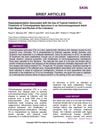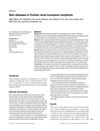 7 citations,
December 2020 in “Clinics in Dermatology”
7 citations,
December 2020 in “Clinics in Dermatology” Some alopecia treatments might help treat COVID-19, but more research is needed.
 1 citations,
September 2020 in “Journal of the Endocrine Society”
1 citations,
September 2020 in “Journal of the Endocrine Society” Men have worse COVID-19 outcomes than women due to genetic and hormonal differences.
 1 citations,
June 2020 in “Dermatologic Therapy”
1 citations,
June 2020 in “Dermatologic Therapy” COVID-19 can cause various skin issues, including rashes and 'COVID toes', and may worsen autoimmune diseases or affect men with baldness more severely.
[object Object]  January 2020 in “DOAJ (DOAJ: Directory of Open Access Journals)”
January 2020 in “DOAJ (DOAJ: Directory of Open Access Journals)” The COVID-19 pandemic caused most hair transplant surgeons in India to stop working, and many planned to change their safety measures afterwards.
 6 citations,
May 1941 in “Science”
6 citations,
May 1941 in “Science” Ducks can get the Rous sarcoma virus if infected shortly after birth, leading to tumors and disease spread.
 25 citations,
December 1995 in “Neurology”
25 citations,
December 1995 in “Neurology” The research found that chickenpox virus spreads in skin through blood then to skin cells, while shingles virus moves from nerves to hair follicle areas before infecting skin cells.
 November 2022 in “The journal of investigative dermatology/Journal of investigative dermatology”
November 2022 in “The journal of investigative dermatology/Journal of investigative dermatology” The study suggests a link between varicella-zoster virus and segmental vitiligo, with evidence of the virus disrupting skin pigment cells.
 April 2023 in “Journal of Investigative Dermatology”
April 2023 in “Journal of Investigative Dermatology” Injecting anti-herpes antibodies locally can prevent skin lesions and sweating problems caused by herpes simplex virus in mice.
[object Object] October 2021 in “The journal of investigative dermatology/Journal of investigative dermatology” Herpes simplex virus infections should be considered in pemphigus patients to avoid unnecessary changes in treatment.

The pandemic worsened mental health and healthcare access for middle-aged women, leading to negative changes in their lifestyle.
 1 citations,
June 2023 in “BMC Pediatrics”
1 citations,
June 2023 in “BMC Pediatrics” Most children recovered from COVID-19 in 4 weeks, but some experienced long-term symptoms, especially older kids.
 2 citations,
March 2020 in “Skin”
2 citations,
March 2020 in “Skin” Using cidofovir cream for a rare skin disease can cause skin darkening.
 January 2021 in “International Journal of Dermatology”
January 2021 in “International Journal of Dermatology” Possible link between COVID-19 and hair loss; more research needed.
 31 citations,
June 2020 in “Dermatologic Therapy”
31 citations,
June 2020 in “Dermatologic Therapy” Patients with chronic skin conditions on systemic treatments did not have worse COVID-19 outcomes and could resume their treatments after recovery.
 15 citations,
June 2004 in “International Journal of Dermatology”
15 citations,
June 2004 in “International Journal of Dermatology” Most kidney transplant patients in the study had skin problems, often related to infections, medication side effects, or skin cancer risks.
 21 citations,
March 2019 in “Journal of The American Academy of Dermatology”
21 citations,
March 2019 in “Journal of The American Academy of Dermatology” The review highlights the need for more research on transgender dermatology, the role of dermatologists in gender affirmation, and the effects of hormone therapy on skin and hair.
 9 citations,
May 2021 in “Dermatologic Therapy”
9 citations,
May 2021 in “Dermatologic Therapy” Possible link between androgens and COVID-19 severity; more research needed.
 7 citations,
April 2021 in “Dermatology and Therapy”
7 citations,
April 2021 in “Dermatology and Therapy” H-1 antihistamines may help with various skin conditions, but more research is needed to confirm their effectiveness.

Antiandrogens might help prevent or treat COVID-19 by blocking the virus's entry into cells.
 April 2005 in “Dermatologic Clinics”
April 2005 in “Dermatologic Clinics” The document summarizes recent dermatological treatments and advances in areas like pediatric care, wound healing, skin closure, light-based therapies, pigment disorders, hair loss, immunotherapy, infection management, melanoma, drug reactions, and facial rejuvenation.
 3 citations,
January 2022 in “Journal of Infection”
3 citations,
January 2022 in “Journal of Infection” Some early COVID-19 mutations in patients predicted future common virus mutations.
 1 citations,
October 2023 in “Romanian Journal of Morphology and Embryology”
1 citations,
October 2023 in “Romanian Journal of Morphology and Embryology” COVID-19 can cause various skin issues, but long-term skin problems are rare.
 December 2000 in “British Journal of Dermatology”
December 2000 in “British Journal of Dermatology” The document corrected previous errors and announced future dermatology events.
 116 citations,
February 2017 in “Journal of the American Academy of Dermatology”
116 citations,
February 2017 in “Journal of the American Academy of Dermatology” JAK inhibitors help with skin conditions but need more research on dosing and safety.
 1 citations,
March 1954 in “Archives of dermatology”
1 citations,
March 1954 in “Archives of dermatology” Animal research has greatly advanced dermatology.
 October 2022 in “Journal of experimental and clinical medicine”
October 2022 in “Journal of experimental and clinical medicine” Repurposing existing drugs for COVID-19 shows promise but requires more research to confirm effectiveness.

COVID-19 may be linked to hair loss called Telogen Effluvium, affecting quality of life and self-esteem.
 June 2020 in “Journal of Dermatological Treatment”
June 2020 in “Journal of Dermatological Treatment” Use telemedicine and strict hygiene for safe hair and scalp treatments during COVID-19.
 112 citations,
May 2019 in “Pharmacological Research”
112 citations,
May 2019 in “Pharmacological Research” Lignans and neolignans from plants may help protect against various health issues, including cancer and heart disease.
 10 citations,
October 2010 in “Hepatology”
10 citations,
October 2010 in “Hepatology” Certain liver diseases respond well to specific treatments and have varying risks for liver cancer.





























